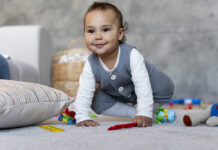This post is also available in: English हिन्दी (Hindi) বাংলা (Bengali)
The first year of a baby’s life is transformative. Babies grow both physically and emotionally. In the first few months, babies learn to bond with their parents. They learn how to recognise their loved ones via gestures, smiles, sounds and touch. Their families become their safety nets and in general they have few fears. They only begin to understand the concept of fear by the time they are about 6 months old.
Common fears in babies:
KITCHEN NIGHTMARES

Dals being ground? Food processor in mid-mix? Cooker blowing off steam? Your kitchen might be too loud for your little one. Vacuum cleaners, flushing toilets and sharp doorbells can also open the gates to loads of baby fears (and tears!)
PETS CAN BE PESTS

We all want our babies to love our pets. And in time they will. But initial interactions might leave your baby bawling. And your pet (especially if he’s a large sad-eyed family dog) feeling very guilty. The thing is that most cats and dogs tend to move rather quickly and suddenly which frightens babies. Pet tortoises, anyone?
THE OUTDOORS GRATE

Vrooming bikes, honking horns, construction work, airplanes roaring overhead – the outdoors can often frighten Junior. Which doesn’t mean that you should make him a home bird. Take him out to a garden or park but keep him sheltered from too much ‘reality’.
NO NEWS IS GOOD NEWS

Watching a dash of telly while baby’s lolling about? Don’t. Your baby does not want to know what the nation wants to know. So keep her away from violent TV programs like mysteries, thrillers and especially news shows.
TOYS THAT MAKE NOISE

Does your baby have an elder brother or cousin? Keep his toy guns, wind-up toys and action figures away from her. Or you’ll have one cranky baby and one sulking big brother.
SEPARATION ANXIETY

This is one of the earliest, most primal of baby fears. Babies often get panicky when at least one of their parents isn’t around. This holds true even when they are being held by an aunt or uncle or someone familiar.
How to handle your baby’s fears:
(A) When your baby is frightened, she needs a mother’s tender touch the most. Just remember, babies who feel scared cannot relax enough to go to sleep. They need to feel safe before they allow themselves to hit sleep mode.
(B) Tough love doesn’t work for babies this small. Don’t force your baby to confront her fears. Just empathise with your little one because she trusts you more than anyone ever will. Empathy from parents is the strongest, most nurturing emotion.
(C) Ensure your baby’s tears don’t make you cry. You need to stay calm at all times. Try giving your baby her favourite toy or comforter. Or play her favourite music. And hold her tight.
(D) Try not to see your baby’s fears as funny however trivial they might seem. And please don’t use these fears as an opportunity for a funny video or photo. Your baby’s ‘LOVE’ is more important than all those ‘LIKE’s.
PS. We aren’t saying you should banish the concept of ‘LIKE’s altogether. If you ‘like’ this blog, please share it with your friends and do let us know in the comments. Ciao for now. Lots more coming up next week.
This post is also available in: English हिन्दी (Hindi) বাংলা (Bengali)










